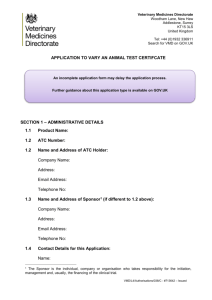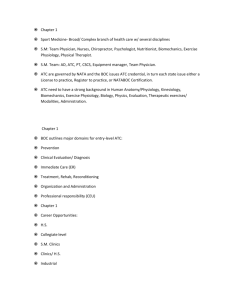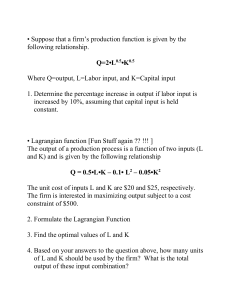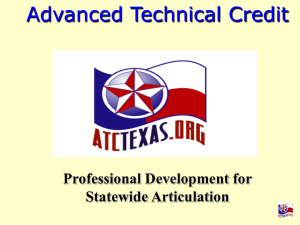of Part I ATC Training
advertisement
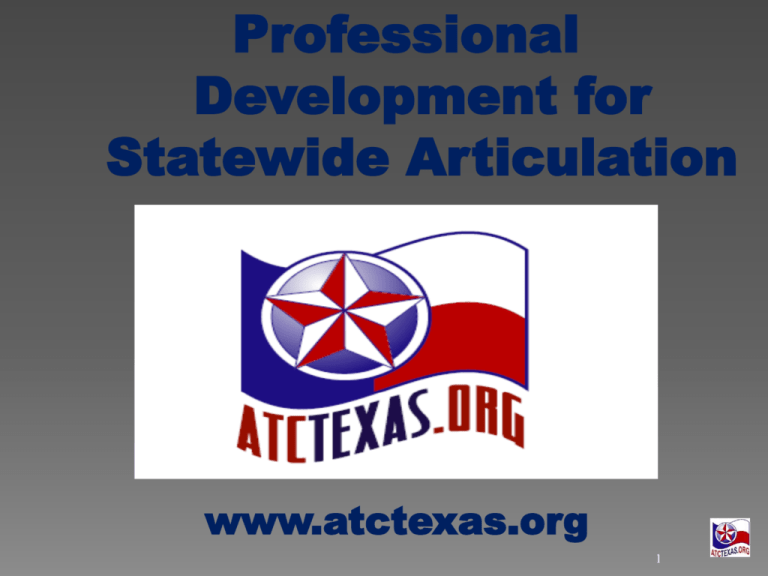
Professional Development for Statewide Articulation www.atctexas.org 1 Articulation Articulation ATC Tech Prep Work Tech Prep Advanced Technical Credit Work 2 Providing eligible high school teachers with the necessary information to successfully teach ATC statewide-articulated Courses. 3 Each ATC course section taught by a school must have an ATC-eligible trained teacher. 4 Teachers must meet college requirements: Requirement 1: The teacher must have a baccalaureate degree or higher in the teaching discipline. OR Requirement 2: The teacher must have a minimum of an associate degree and 3 years verifiable non-teaching work experience directly related to the teaching discipline. 5 The teacher’s degree and/or work experience must be related directly to the teaching discipline. (approval based more on cluster area). › For instance, a teacher with a degree in biology would not qualify to teach Anatomy and Physiology in the Health Science Cluster unless they also had a degree and/or work experience related to hands on patient care. 6 Teachers will need to submit official transcripts sent to SFASU ATC Office and detailed work history if requested. All teachers must possess required industry certifications if applicable. For example; registered nurse, CNI or ASE certifications. 7 The school still may offer the regular nonATC course at the high school. ATC approval is related to community college faculty requirements. SBEC certification is related to high school teacher requirements. 8 ATC PART I ATC PART II General instruction Two hours minimum (on line) Course-specific instruction One hour minimum per college course TRAINING REQUIRED BY TEA EVERY THREE YEARS. 10 Both ATC Part I and Part II MUST be completed before the 3rd Friday in September deadline. 11 There are two main types of articulation: Program articulation Tech Prep programs Course articulation Local articulation Statewide articulation 12 Local Course Articulation Agreements are: Course-to-course agreements between one high school or school district and one college or college district system. 13 Statewide Course Articulation is: A statewide agreement between the Texas Higher Education Coordinating Board and the Texas Education Agency. A state-designed, advanced college placement program, the Advanced Technical Credit Program (ATC). 14 Statewide Articulation allows students to: Attend any of a variety of participating colleges. Save time and money. 15 Statewide Articulation is Tech Prep Statewide Articulation NOT IS One element of College Tech Prep. One method to earn college credit in high school. 16 A federally funded initiative Seamless, non-duplicative education Participation leads to post secondary program enrollment 17 Tech Prep AAS degrees by area Computer Science 10% Protective Services 6% Mechanics 8% Drafting & Manufacturing 10% Family Sciences 6% Engineering Related 12% All Others 9% Business 23% Health 16% Source: Texas Higher Education Coordinating Board 18 Course Requirements Content-enhanced beyond TEKS College-level course competencies define expected student outcomes Courses = at least 1 credit 19 Teacher Requirements Teacher credentials Official Transcripts submitted to ATC Office. ATC training and approval 20 Junior or senior year completion of sequence Grade of at least 80%…...And Enroll in a related technical degree program Enroll within 15 months of graduation (time may be extended) Credit awarded on enrollment? (however, a college may elect to require up to six credit hours) 21 Obstacles: Not all colleges are participating. Not all courses or programs are offered at all colleges. HS courses must be applied to a two-year technical program to receive credit. 22 Student completes enhanced HS ATC course or sequence Passed with 80+ %? No No Yes No Not eligible for College credit Yes Sequence Completed in Jr or Sr year if needed? Within 15 months of graduation? Declared technical major? Yes No No Yes Optional - 6 hrs non-developmental credit? Yes Student enrolls at community college Student receives college credit 23 Student A Earns an 80% in BUSMGT (1 credit) in the 9th grade AND Takes no other related career and technology courses 24 Student A is not eligible because a sequence has not been completed in their junior or senior year. 25 Student B Earns a 90% in BUSIM1 (1 credit) in the 9th grade AND Earns an 80% in BUSIM2 (1 credit) in the 12th grade 26 Answer to Student B: Student B will get credit for both courses…a sequence was completed in the junior or senior year. 27 Student C Earns an 80% in PRINHLSC (1 credit) in the 9th grade. AND Earns an 80% in ADVWELD (1 credit) in the 11th grade. (and takes no other ATC courses) 28 Answer #3 Answer to Student C: Student would not be eligible for credit for PRINHLC because they did not take any ATC courses related to PRINHLC in their junior or senior year. They are eligible for credit in ADVWELD. 29 When a course is not offered by at least five community colleges and/or school districts across the state, the State Leadership Committee may recommend the removal of the course. Any course(s) to be added or removed from the Crosswalk MUST be approved by the State Leadership Committee prior to any change being made. 30 Athena M. Friday-Black Program Manager ATC Athena.M.Friday-Black@LoneStar.edu (281) 290-2848 31 Stephen F. Austin State University Dr. Bill Wilson ATC Program Coordinator wilsonwe@sfasu.edu Krista Guerrero ATC Assistant Program Coordinator guerrerokk@sfasu.edu 32


